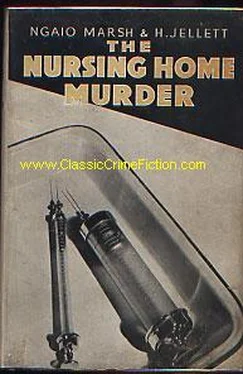Ngaio Marsh - The Nursing Home Murder
Здесь есть возможность читать онлайн «Ngaio Marsh - The Nursing Home Murder» — ознакомительный отрывок электронной книги совершенно бесплатно, а после прочтения отрывка купить полную версию. В некоторых случаях можно слушать аудио, скачать через торрент в формате fb2 и присутствует краткое содержание. Жанр: Классический детектив, на английском языке. Описание произведения, (предисловие) а так же отзывы посетителей доступны на портале библиотеки ЛибКат.
- Название:The Nursing Home Murder
- Автор:
- Жанр:
- Год:неизвестен
- ISBN:нет данных
- Рейтинг книги:5 / 5. Голосов: 1
-
Избранное:Добавить в избранное
- Отзывы:
-
Ваша оценка:
- 100
- 1
- 2
- 3
- 4
- 5
The Nursing Home Murder: краткое содержание, описание и аннотация
Предлагаем к чтению аннотацию, описание, краткое содержание или предисловие (зависит от того, что написал сам автор книги «The Nursing Home Murder»). Если вы не нашли необходимую информацию о книге — напишите в комментариях, мы постараемся отыскать её.
The Nursing Home Murder — читать онлайн ознакомительный отрывок
Ниже представлен текст книги, разбитый по страницам. Система сохранения места последней прочитанной страницы, позволяет с удобством читать онлайн бесплатно книгу «The Nursing Home Murder», без необходимости каждый раз заново искать на чём Вы остановились. Поставьте закладку, и сможете в любой момент перейти на страницу, на которой закончили чтение.
Интервал:
Закладка:
“Can you remember at all?” he said.
“My sister-in-law often came in after dinner. At times my husband found these visits a little trying. He liked to be quiet in the evenings. I believe on that night he suggested that she should be told he was out. However, she came in. We were in the study.”
“You both saw her, then?”
“Yes.”
“What happened?”
“She urged him to try his medicine. He put her off. I told her he expected Sir John Phillips and that we ought to leave them alone. I remember she and I met Sir John in the hall. I thought his manner very odd, as I believe I told you.”
“So you went out, leaving the medicine in the study?”
“I suppose so — yes.”
“Did you come across it again?”
“I don’t think so.”
“May I speak to your butler — Nash, isn’t it?”
“If you think it is any help.” She rang the bell.
Nash came in and waited.
“Mr. Alleyn wants to speak to you, Nash,” said Lady O’Callaghan. Nash turned a respectful eye towards him.
“I want you to think back to the Friday evening before Sir Derek’s operation,” Alleyn began. “Do, you remember that evening?”
“Yes, sir.”
“There were visitors?”
“Yes, sir. Miss O’Callaghan and Sir John Phillips.”
“Exactly. Do you remember noticing a chemist’s parcel anywhere in the study?”
“Yes, sir. Miss O’Callaghan brought it with her, I believe.”
“That’s the one. What happened to it?”
“I had it removed to a cupboard in Sir Derek’s bathroom the following morning, sir.”
“I see. Had it been opened?”
“Oh, yes, sir.”
“Can you find it now, Nash, do you think?”
“I will ascertain, sir.”
“Do you mind, Lady O’Callaghan?” asked Alleyn apologetically.
“Of course not.”
Nash inclined his head solemnly and left the room. While he was away there was a rather uncomfortable silence. Alleyn, looking very remote and polite, made no effort to break it. Nash returned after a few minutes with the now familiar carton, on a silver salver. Alleyn took it and thanked him. Nash departed.
“Here it is,” said the inspector cheerfully. “Oh, yes, Nash was quite right; it has been opened and — let me see — one powder has been taken. That doesn’t amount to much.” He put the carton in his pocket and turned to Lady O’Callaghan. “It seems ridiculous, I know, to worry about so small a matter, but it’s part of our job to pick up every thread, however unimportant. This, I suppose, was the last effort Miss O’Callaghan made to interest Sir Derek in any remedy?”
Again she waited for a few seconds.
“Yes,” she murmured at last, “I believe so.”
“She did not mention another remedy to you after he had been taken to the hospital?”
“Really, Inspector Alleyn, I cannot possibly remember. My sister-in-law talks a great deal about patent medicines. She tries to persuade everyone she knows to take them. I believe my uncle, Mr. James Rattisbon, has already explained this to you. He tells me that he made it quite clear that we did not wish this matter to be pursued.”
“I am afraid I cannot help pursuing it.”
“But Mr. Rattisbon definitely instructed you.”
“Please forgive me,” said Alleyn very quietly, “if I seem to be unduly officious.” He paused. She looked’at him with a kind of cold huffiness. After a moment he went on. “I wonder if you have ever seen or read a play called Justice , by Galsworthy? It is no doubt very dated, but there is an idea in it that I think explains far better than I can the position of people who become involved, whether voluntarily or involuntarily, with the Law. Galsworthy made one of his characters — a lawyer, I think — say that once you have set in motion the chariot wheels of Justice, you can do nothing at all to arrest or deflect their progress. Lady O’Callaghan, that is the exact truth. You, very properly, decided to place this tragic case in the hands of the police. In doing so you switched on a piece of complicated and automatic machinery which, once started, you cannot switch off. As the police officer in charge of this case I am simply a wheel in the machine. I must complete my revolutions. Please do not think I am impertinent if I say that neither you nor any other lay person, however much involved, has the power to stop the machine of justice or indeed to influence it in any way whatever.” He stopped abruptly. “I am afraid you will think me impertinent — I have no business to talk like this. If you will excuse me— ”
He bowed and turned away.
“Yes,” said Lady O’Callaghan, “I quite understand. Good afternoon.”
“There’s one other thing,” said Alleyn. “I had nearly forgotten it. It’s something that you can do, if you will, to help us as regards the hospital side of the problem.”
She listened, apparently without any particular surprise or agitation, to his request, and agreed at once to do as he suggested.
“Thank you very much indeed, Lady O’Callaghan. You understand that we should like Miss O’Callaghan to be with you?”
“Yes,” she said after a long pause.
“Shall I see her, or — perhaps you would rather ask her yourself?”
“Perhaps that would be better. I would much prefer her to be spared this unnecessary ordeal.”
“I assure you,” said Alleyn dryly, “that it may save her a more unpleasant one.”
“I’m afraid I do not understand you. However, I shall ask her.”
In the hall he walked straight into Miss Ruth O’Callaghan. When she saw him she uttered a noise that was something between a whoop of alarm and a cry of supplication, and bolted incontinently into the drawing-room. Nash, who had evidently just admitted her, looked scandalised.
“Is Mr. Jameson in, Nash?” asked Alleyn.
“Mr. Jameson has left us, sir.”
“Really?”
“Yes, sir. His duties, as you might say, have drawn to a close.”
“Yes,” said Alleyn, unconsciously echoing Lady O’Callaghan. “I quite understand. Good afternoon.”
CHAPTER XVI
Reconstruction Begun
Thursday, the eighteenth. Afternoon.
Alleyn found he still had over an hour to wait before the reconstruction. He had tea and then rang up Dr. Roberts, found he was at home, and made his way once more to the little house in Wigmore Street. He wanted, if possible, to surprise Roberts with an unexpected reference to the Lenin Hall meeting. The diminutive manservant admitted him and showed him into the pleasant sitting-room, where he found Roberts awaiting him.
“I hope I’m not a great nuisance,” said Alleyn. “You did ask me to come back some time, you know.”
“Certainly,” said Roberts, shaking hands. “I am delighted to see you. Have you read my book?” He swept a sheaf of papers off a chair and pulled it forward. Alleyn sat down.
“I’ve dipped into it — no time really to tackle it yet, but I’m enormously interested. At Lord knows what hour this morning I read the chapter in which you refer to the Sterilization Bill. You put the case for sterilization better than any other sponsor I have heard.”
“You think so?” said Roberts acidly. “Then you will be surprised to hear that although I have urged that matter with all the force and determination I could command, I have made not one inch of headway — not an inch! I am forced to the conclusion that most of the people who attempt to administer the government of this country are themselves certifiable.” He gave a short falsetto laugh and glared indignantly at Alleyn, who contented himself with making an incredulous and sympathetic noise.
“I have done everything — everything,” continued Roberts. “I joined a group of people professing enlightened views on the matter. They assured me they would stick at nothing to force this Bill through Parliament. They, professed the greatest enthusiasm. Have they done anything?” He paused oratorically and then in a voice of indescribable disgust he said: “They merely asked me to wait in patience till the Dawn of the Proletariat Day in Britain.”
Читать дальшеИнтервал:
Закладка:
Похожие книги на «The Nursing Home Murder»
Представляем Вашему вниманию похожие книги на «The Nursing Home Murder» списком для выбора. Мы отобрали схожую по названию и смыслу литературу в надежде предоставить читателям больше вариантов отыскать новые, интересные, ещё непрочитанные произведения.
Обсуждение, отзывы о книге «The Nursing Home Murder» и просто собственные мнения читателей. Оставьте ваши комментарии, напишите, что Вы думаете о произведении, его смысле или главных героях. Укажите что конкретно понравилось, а что нет, и почему Вы так считаете.











